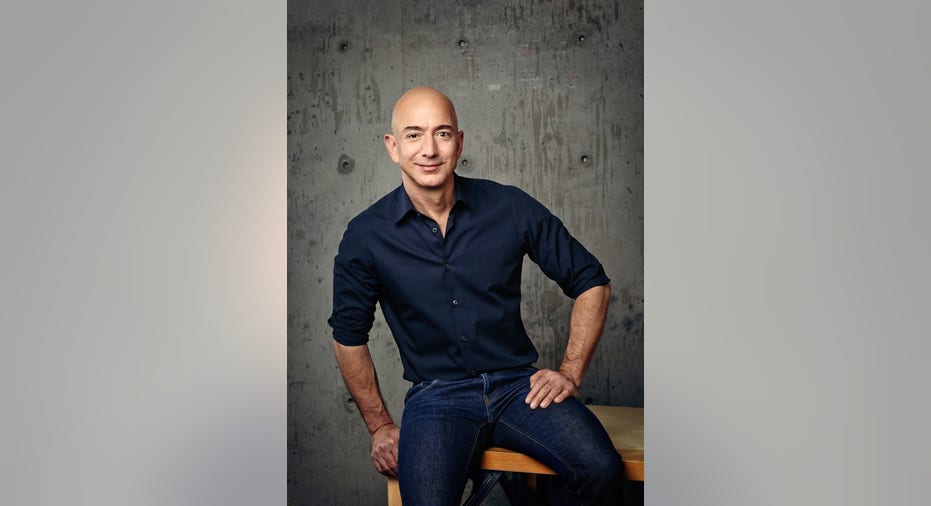This Is the Only Company Spending More on R&D Than Alphabet

Alphabet is well known for its "moonshot" projects, those business ideas that will either crash and burn or become the next $10 billion idea. In fact, it restructured the whole company because it invests so much in those moonshots. Over the past 12 months, Alphabet has spent $12.9 billion trying to find the next big thing in tech while innovating around its existing products.
AMAZON CEO JEFF BEZOS. IMAGE SOURCE: AMAZON.com.
But one company has somehow spent even more. Amazon.com has managed to spend $13.3 billion on research and development over the same period. And CEO Jeff Bezos indicated that its efforts aren't going to slow down anytime soon. He's also fond of taking moonshots -- he owns a spaceflight company, after all -- and Amazon continues to pump out new technology every year.
A tech company that does retail
Amazon may have started as a retail company, but it has since transformed into a tech company. From cloud computing to tablets and smart speakers to robot-filled warehouses to algorithms predicting the next item shoppers will want to buy, Amazon has its hands in a lot of technology.
The fact that it does retail has become secondary to the company's efforts in tech. Basically all of Wall Street is clamoring about the growth of AWS -- Amazon's cloud-computing business -- and its potential as a profit driver going forward. (I'm guilty of that, too.) That's despite a 25% year-over-year increase in its retail sales last quarter, when most retailers saw a decline in revenue.
Amazon's technology is mostly used to support its retail operations.
- Its line of Kindle tablets and e-readers helped usher in the age of e-books and supports a thriving independent publishing industry. Oh, and Amazon helps those independent publishers publish those e-books as well.
- Its line of smart speakers and Fire TV devices urge consumers to subscribe to Amazon Prime to get the most out of those devices.
- Its new robot-filled eighth-generation fulfillment centers allow it to ship orders more quickly and efficiently.
- AWS started off by renting out excess server space Amazon wasn't using to run its own online retail operations.
- And it's always tweaking its software for product recommendations, search results, advertising technology, and its website as a whole.
But the biggest sign that Amazon is a tech company and not a retailer is that no other retailer has research and development expenses -- unless you count Apple or Microsoft, which got into retail well after establishing themselves as tech companies.
Not afraid to fail
THE FIRE PHONE. IMAGE SOURCE: AMAZON.com.
Amazon has had its fair share of technology failures. Most recently it introduced a smartphone that nobody bought, and it was forced to write down $170 million in inventory. But Bezos thinks failure is actually a good thing. "The size of your mistakes needs to grow along with" the company, Bezos told The Washington Post in an interview. "If it doesn't, you're not going to be inventing at scale that can actually move the needle." Referring to the Fire Phone in particular, he said, "If you think that's a big failure, we're working on much bigger failures right now."
Amazon will take chances on just about anything. Alphabet operates the same way. Both take the same approach as venture capitalists -- the one big success will pay for all the mistakes. Amazon has already had quite a few to make up for the Fire Phone, Amazon Destinations, and its defective diaper debacle, among other failures. Likewise, Alphabet's investments in Fiber, and the expansion of Nest and Calico made up for things like Google Glass and other losers.
Sometimes failures allow Amazon to produce better more profitable products later on. The defunct Amazon Auctions site led to Amazon's third-party marketplace, which is a huge revenue growth driver for its retail operations.
Investors should expect R&D expenses at Amazon to continue rising, particularly as AWS expands. It's been able to successfully build upon its successes, which will continue to make up for losses from failed developments. And keep in mind that some of Amazon's biggest failures produced some of Amazon's biggest successes.
The article This Is the Only Company Spending More on R&D Than Alphabet originally appeared on Fool.com.
Suzanne Frey, an executive at Alphabet, is a member of The Motley Fool's board of directors. Adam Levy owns shares of Amazon.com and Apple. The Motley Fool owns shares of and recommends Alphabet (A shares), Alphabet (C shares), Amazon.com, and Apple. The Motley Fool owns shares of Microsoft and has the following options: long January 2018 $90 calls on Apple and short January 2018 $95 calls on Apple. Try any of our Foolish newsletter services free for 30 days. We Fools may not all hold the same opinions, but we all believe that considering a diverse range of insights makes us better investors. The Motley Fool has a disclosure policy.
Copyright 1995 - 2016 The Motley Fool, LLC. All rights reserved. The Motley Fool has a disclosure policy.



















